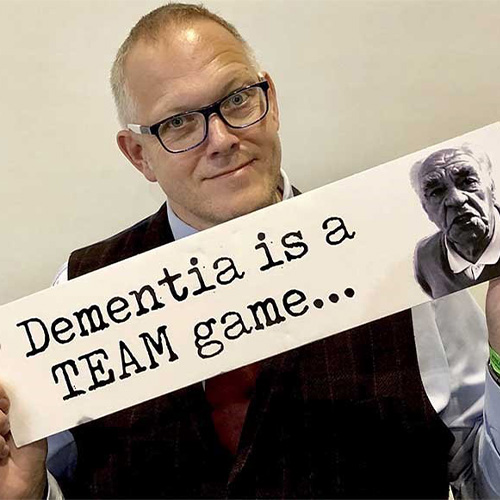Read below notes and updates of his timely conference that focuses on the important issue of improving end of life care for people with dementia. People with advanced dementia have been disproportionately impacted by Covid-19, it is imperative that we ensure people are supported and cared for effectively at the end of life during this challenging time. The conference demonstrates, through national updates and practical case studies how you can improve end of life care for people with dementia in your service.
Chair’s welcome and introduction
 Ian Donaghy
Ian Donaghy
Keynote Speaker, Conference Host, Trainer, Author of Dear Dementia, The Missing Peace & A Pocketful of Kindness
Ian Donaghy Biography 0.06 MBDOCXfile
Covid-19 & Dementia: Supporting people and improving care through Covid-19
 Dr Karen Harrison-Dening
Dr Karen Harrison-Dening
Head of Research and Publications, Dementia UK
and Professor of Dementia Nursing,
De Montford University
• the impact of the Covid-19 pandemic on people with dementia and their carers
• how can we better support people at the end of life?
• how can we better support carers during the pandemic?
• working with care homes
• recommendations for improvement
In her presentation, Dr Karen Harrison- Dening discusses frequently asked questions and issues raised during Covid-19. Karen discusses the impact of media during Covid-19 on carers and family members of people living with dementia.
The impact of 'Lifeboat' ethics like the removal of non-essential services, triage, rationing and the intensification of poor quality care, in the context of people living with dementia and the diagnosis of dementia is discussed, as well as how the effect of these steps make people living with dementia feel robbed of valuable time, social engagement and interaction.
Dr Harrison- Dening presents the importance of Advance Care Planning in palliative and end of life care. This differs from routine care planning. Advance Care Planning is defined as a process of discussing and recording of wishes, values, and preferences for future care and treatment held between an individual, family members and their care provider(s) (Sudmore et al. 2017) that takes effect when the person loses capacity (Teixiera et al. 2013).
Questions and issues to consider going forward:
- Do we really value people living with dementia?
- Government need to reflect on their inclusiveness of older people and of people with dementia more when addressing such health crises.
- Guidance for care sector needs to be sharper, useful and instructive but importantly, timely.
- Advance care planning has huge potential in guiding goals of care for this vulnerable population but we have to get beyond the ‘DNR and funeral plan mentality
Dr Karen Harrison-Dening Biography and Abstract 0.01 MBDOCXfile
Prescribing to avoid cognitive side effects and delirium at the end of life
 Delia Bishara
Delia Bishara
Consultant Pharmacist, Mental Health of Older Adults & Dementia, South
London and Maudsley NHS Foundation Trust
• cognitive side effects of medication
• risks associated with anticholinergic medication in older people
• safe prescribing to avoid delirium
• medications management and review
Delia presents a detailed guide on medication and possible side effects that need to be taken in consideration when treating people living with dementia, more precisely the presentation contains details on:
- Drugs that cause cognitive impairment/confusion/ delirium
- Anticholinergic drugs- Risks in older people
- Anticholinergic drug scales
- The Anticholinergic Effect on Cognition (AEC) Scale
- MediChec
- Antipsychotics in Dementia
Delia Bishara Biography and Abstract 0.02 MBDOCXfile
Predicting and recognising last days of life and managing uncertainty
 Dr Adrian Treloar
Dr Adrian Treloar
Trustee, Hope for Home
Consultant and Senior Lecturer in Old Age Psychiatry
Oxleas NHS Trust and the Institute of Psychiatry
• what can multi professional teams do to reduce the impact of uncertainty of recognising when a person is entering the last days of life?
• identifying how the uncertainty of recognising when a person is entering the last days of life influences information sharing, advance care planning and the behaviour of healthcare professionals
• ensuring all staff can recognise signs and symptoms that indicate that adults are likely to be entering their final days of life; or that they may be recovering?
• managing and communicating uncertainties in dementia & and end of life care
